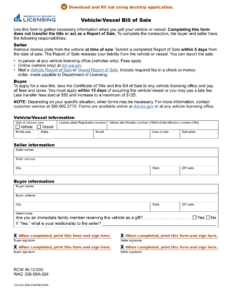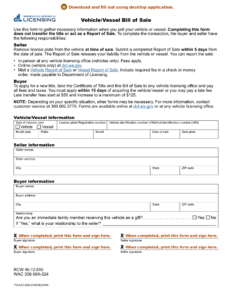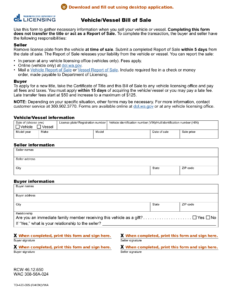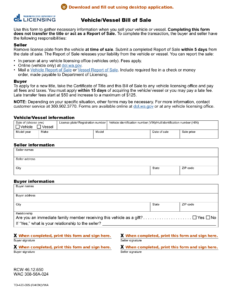When you’re buying or selling a vehicle in Washington State, one document stands out as absolutely essential for a smooth and legal transfer of ownership: the bill of sale. It’s more than just a receipt; it’s a legal record of the transaction that protects both the buyer and the seller, ensuring clarity and preventing potential disputes down the line. Without a properly completed bill of sale, you could encounter significant hurdles when trying to register the vehicle with the Washington State Department of Licensing (DOL) or if any issues arise after the sale.
Understanding what makes a bill of sale valid and how to correctly fill one out is crucial for peace of mind. This article will guide you through the importance of this document and help you understand how a reliable vehicle bill of sale WA template can make your vehicle transaction effortless and legally sound, safeguarding your interests whether you’re handing over the keys or receiving them.
Why a Bill of Sale is Crucial in Washington State
A bill of sale for a vehicle in Washington State isn’t just a formality; it’s a vital legal instrument that serves several critical purposes. For starters, it provides an official record of the transfer of ownership from one party to another. This document acts as proof that the transaction occurred, detailing the specific vehicle, the agreed-upon price, and the date of sale. This protects the seller from any liability for the vehicle after it’s been sold, such as parking tickets or accidents, and ensures the buyer has the necessary documentation to prove ownership and register the vehicle.
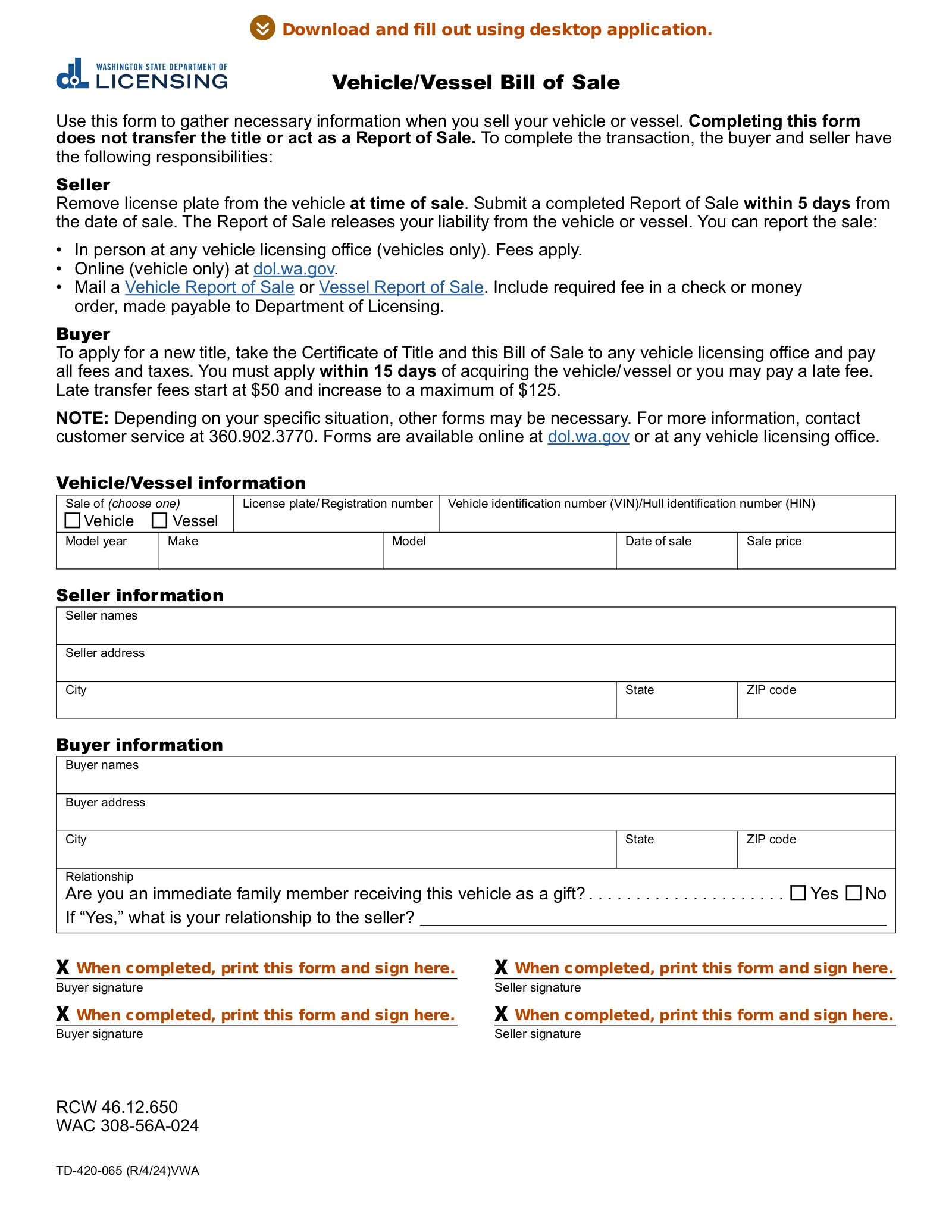
Furthermore, the Washington State Department of Licensing (DOL) requires a bill of sale as part of the vehicle title transfer process. Without it, you simply cannot complete the registration and titling of your newly acquired vehicle. It’s also crucial for calculating sales tax, as the document clearly states the purchase price. For both parties, it establishes the terms of the agreement, including the vehicle’s condition at the time of sale, helping to prevent future disagreements or misunderstandings about the vehicle’s state or the transaction details.
Key Elements of a Valid WA Vehicle Bill of Sale
To be considered legally sound and acceptable by the Washington State DOL, a vehicle bill of sale must include specific information. Missing even one crucial detail could lead to delays or complications during the title transfer process. Ensuring all these elements are accurately captured protects both the buyer and the seller.
- Vehicle Information: This includes the vehicle’s Year, Make, Model, Vehicle Identification Number (VIN), and Odometer Reading at the time of sale. The VIN is particularly important as it uniquely identifies the vehicle.
- Buyer and Seller Information: Full legal names and addresses for both the buyer and the seller must be clearly stated. This ensures that the parties involved in the transaction are clearly identified for legal purposes.
- Sale Details: The exact date of the sale and the agreed-upon purchase price are essential. This information is critical for tax purposes and establishing the timeline of ownership transfer.
- Signatures: Both the buyer and the seller must sign and date the document. Signatures signify agreement to the terms outlined in the bill of sale.
- Odometer Disclosure Statement: Washington state law, in accordance with federal regulations, requires an odometer disclosure statement to be included, indicating whether the mileage is actual, not actual, or exceeds mechanical limits.
Beyond these core elements, it’s also good practice to include a statement indicating that the vehicle is sold “as-is,” especially in private sales. While this doesn’t absolve the seller of all responsibilities, it helps to set expectations regarding the vehicle’s condition post-sale. Ensuring every blank on your vehicle bill of sale WA template is accurately filled will save you a lot of potential headaches later on.
How to Use and Obtain Your Vehicle Bill of Sale Template
Finding a reliable vehicle bill of sale WA template is the first step towards a smooth transaction. You can often find official or recommended templates on the Washington State Department of Licensing (DOL) website, or through reputable legal forms websites. Using a template designed specifically for Washington ensures that it includes all the necessary state-specific requirements, reducing the risk of errors or omissions that could delay your vehicle registration. Once you have your template, the process of filling it out correctly is paramount to its validity.
When you’re ready to fill out your chosen vehicle bill of sale WA template, gather all the required information beforehand. This includes the full names and addresses of both the buyer and seller, the complete details of the vehicle (VIN, make, model, year, odometer reading), and the agreed-upon sale price and date. Take your time to accurately input all the data. Double-check every field to ensure there are no typos or discrepancies, as even small errors can cause issues with the DOL. It’s always a good idea to have both parties review the completed document before signing to confirm accuracy and mutual agreement on all terms.
A bill of sale is especially crucial in private sales, where there isn’t a dealership to handle the paperwork. It formalizes the agreement between two individuals, providing a clear record for both parties. This document is also vital if you’re gifting a vehicle, as it still needs to be transferred and registered, and the bill of sale can indicate a gift (zero purchase price) for tax purposes. Even for vehicles with low value, having this record is essential for legal clarity and to prevent future disputes over ownership or liability.
Once the bill of sale is completed and signed by both parties, make sure to create copies for everyone involved. The buyer will need a copy for vehicle registration with the Washington State DOL, and the seller should retain a copy for their records, particularly for tax purposes and to prove they are no longer the vehicle’s owner. While notarization isn’t always required for a standard vehicle bill of sale in Washington, it can add an extra layer of legal security, especially for higher-value transactions or if there are any unique circumstances. Always keep your copy in a safe place, alongside other important vehicle documents like the title.
Having a meticulously completed bill of sale provides invaluable peace of mind for both parties involved in a vehicle transaction. It serves as undeniable proof of the transfer of ownership, details the financial aspects, and fulfills state legal requirements, streamlining the often complex process of buying or selling a car.
Ensuring every detail is accurate and complete on this vital document is a straightforward step that offers significant protection and clarity. By taking the time to correctly prepare and execute this form, you can confidently navigate the process, knowing that you’ve secured your legal standing and facilitated a seamless transfer of vehicle ownership within Washington State.
